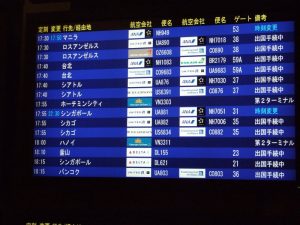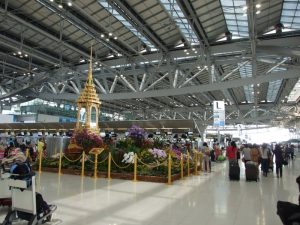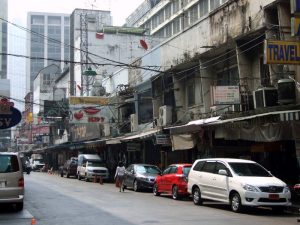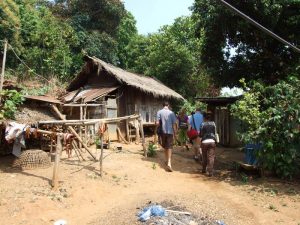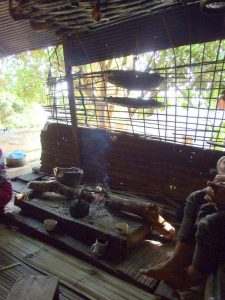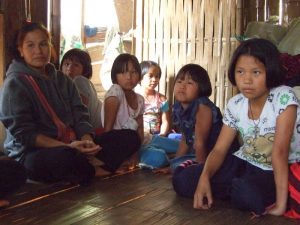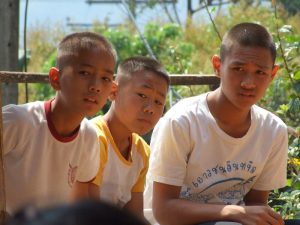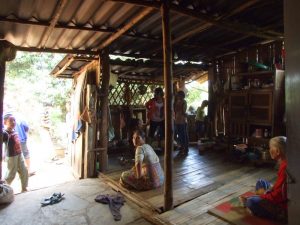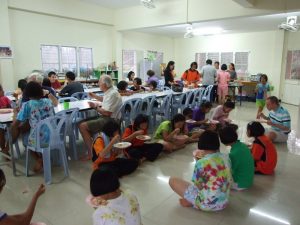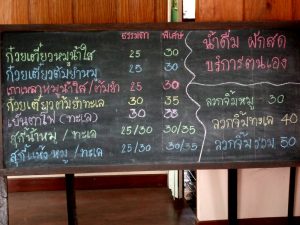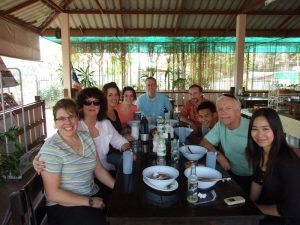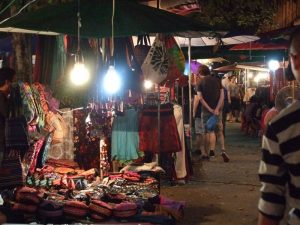Nathan and I left on Wednesday morning and flew to Washington D.C. After a bit of a layover, we got on the 14 hour flight to Narita (Tokyo), Japan. I have done long flights before, but that is the longest one I have ever done, and it sure felt like it. One interesting thing was that we were following the sun, so it never set, and we just leaped into the next day. The airport in Narita is big, and we didn’t have a ton of time to change flights, so it was a little disconcerting when we raced out to find our connector and realized all the signs were in Japanese. Of course they would be, but I guess I hadn’t thought about that. When I’ve been in Europe or Africa or Central America, at least I recognize the city names, but I am lost with the characters. This became a theme for our whole trip. Fortunately we realized one sign was flipping through several languages, one of them English, and we were on our way.
We were delayed on our 6.5 hour flight to Bangkok, and got in at 1 in the morning. Waiting for our shuttle to the hotel, we met the rest of our team for the first time – 3 couples from Portland, Oregon who support Remember Nhu’s ministry – and they turned out to be lovely as we got to know them on the trip. We got to the hotel at about 2 in the morning, and slept hard because we hadn’t slept at all for the previous 30ish hours.
After breakfast, Carl, the founder of Remember Nhu, took us to the PatPong district in Bangkok which is notorious for sex tourism and trafficking. I can’t even share some of the pictures I took because the language on the signage is too graphic. We started to realize the scope of the issue. Some estimate that 15% of the GDP here is prostitution. Remember Nhu is trying to prevent children from ever being trafficked, and it was very difficult as a parent to know that there were children living behind those windows who were in slavery and being abused in ways I don’t even want to think of. All along, the children we met who were impacted by this were the ages of our children, and that just broke my heart even more.
That afternoon we left for another destination which would be our home base for much of our time. When we came out of the airport, the pollution, which had been terrible in Bangkok, seemed even thicker. We were told, though, that in Bangkok it is permanent pollution whereas here it was because they had just burned all the rice fields, something they do after every harvest, and that was making the smog. I can’t say it cleared much in the time we were there, and many of my pictures have a mysterious mistiness about them.
After trying very hard to sleep that night even though we were 12 hours off from our timezone, we spent our first full day at one of the homes run by Remember Nhu. The children who live there have come for many reasons. Some are orphans or effectively orphaned (for example, if the parents are incarcerated), some were in danger in their homes, some are so poor their parents cannot keep them, but all were at risk for trafficking.
These children are amazing. We played a lot of Uno, and “Ninja” and jump-rope. Then we realized a previous team had left the children a keyboard, but no one knew how to play it. Several of the kids were learning guitar, but when they realized I knew how to play the keyboard, I was swamped with kids who wanted me to teach them. It’s hard to teach when you don’t share language, but I’ve never seen such persistence in children, and was able to teach several songs.
One of the sweetest moments of the week was when I realized that we knew several of the same worship songs – I would sing in English, and they would sing in their language. All praising the same God. Many of the kids in the homes have become Christians even though this is an almost entirely Buddhist nation. Some of them spoke some English, and when I asked them why they had become Christians, they said that they had seen “love” from both sides, and that Christian love was a different love – it was real.
The next day we went to a small tribal village to interview some of the children who were candidates to come to R-Nhu. Carl has told us that he has been to villages where there are no children left. The main risk factors for a child are severe poverty, if a relative is in the trade, if there is sexual abuse occurring in the home, if the child is orphaned or effectively orphaned, or if the mother remarries and the new husband refuses to take her children. The families are not usually told what will really happen to their child if they are sold. Often they are told they will become maids or servants in a wealthy home where they will be well cared for, and even if they suspect that this might not be true, it’s compelling, especially when the alternative for many of them is starvation.
We saw a lot of poverty here, and really, a lot of disparity. When we were in Kenya, when we went to a poor village, everyone was poor. Here, everyone was poor by U.S. standards, but some were desperately poor, living in bamboo huts and cooking over open fires, while others had concrete walls and even some electricity or a truck. We interviewed several children, and the stories were heartbreaking. I was impressed with many of the mothers. They loved their children so much, and desperately wanted what was best for them – they just couldn’t provide it. R-Nhu helps in many ways, only one of which is taking the children in.
After interviewing all afternoon, we went back to the girls’ home before going to see the night market. It’s hard to get those kids out of my head and heart, and perhaps I won’t try too hard.
Want to see lots more pictures? Check out the full album here!

